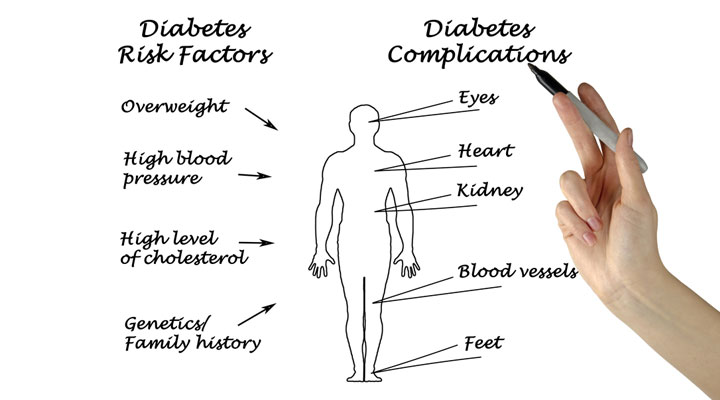How Diabetes Affects the Body Over Time
Diabetes is a chronic illness that can cause significant harm, particularly when left untreated. The long-term complications of diabetes reach far beyond the pancreas and can include serious injuries or even death. Understanding how diabetes affects the human body may motivate patients to seek treatment and consequently live longer, fuller lives.
Heart
According to the American Diabetes Association, heart disease and related complications are the leading cause of death among people with diabetes. Diabetics are more likely than others to suffer from heart attacks, heart failure, and strokes. They are also more likely to do so at a younger age than people without diabetes. Recent research has identified optimal blood sugar levels for heart health. Because these levels can vary with age and other factors, it is important to consult a physician before altering any course of treatment. Diabetics who are concerned about keeping their heart in good shape are also generally free to take the same preventative steps recommended for non-diabetics. These include:
- Quitting smoking
- Keeping cholesterol levels low
- Exercising Regularly
- Eating healthy, balanced meals
Blood Vessels
The risk of blood vessel damage that contributes to higher rates of heart disease among diabetics can also cause problems in other parts of the body. Extremities are especially susceptible to tissue damage initially caused by weakened blood vessels. Although it can be hard for long-term diabetics to avoid this inevitable complication altogether, they may greatly reduce the damage and limit the likelihood of amputation by checking thoroughly and regularly for potential problems. Catching and treating damage before infection has had a chance to set in can be the difference between losing and saving a finger or foot.
Nerves
The primary reason that diabetics fail to notice catastrophic tissue damage is because diabetes can also damage nerves. Diabetic neuropathy is a condition that usually begins as a loss of sensation in a patient’s fingers and toes. Over time, the condition worsens. Symptoms may include:
- Tingling, or “pins and needles”
- Burning
- Inability to feel warmth or cold
- Numbness
- Bowel or bladder control problems
- Weakness
- Male impotence
- Abnormal blood pressure
In extreme cases, the nerve damage may become so severe that a diabetic suffering from a heart attack cannot feel any chest pain during the attack.
Kidneys
The kidneys are responsible for filtering and cleaning blood. Because a diabetic’s blood often contains excess glucose, that person’s kidneys have to work harder than those of a non-diabetic. Years of this excess strain can eventually cause kidney failure. While diabetics who are careful to monitor their blood sugar are far less likely to suffer serious kidney damage than those who are unwilling or unable to keep their glucose levels in check, all diabetics should be aware of the signs that something is wrong with these important organs. Symptoms of kidney failure include:
Anyone experiencing two or more of these symptoms should consult with a physician as soon as possible.
Eyes
The same weak blood vessels that can cause damage in the heart, hands, and feet can also affect the vision of a diabetic. In fact, diabetes is the leading cause of adult blindness. In some cases, damaged blood vessels in the retina can blur or block vision. Diabetics also develop cataracts and glaucoma at higher rates than non-diabetics. Again, it is important for people with diabetes to consistently monitor the quality of their eyesight and immediately report any problems to their doctor.
In addition to the long-term complications detailed above, diabetics also experience more urinary tract infections, respiratory infections, and gum disease than others. Because diabetes can cause problems in so many different parts of the body, diabetics should always pay close attention to possible symptoms. In many cases, early awareness and quick treatment can drastically reduce the impact these long-term complications can have on a diabetic’s quality of life.
